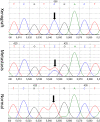Comparative lesion sequencing provides insights into tumor evolution
- PMID: 18337506
- PMCID: PMC2393770
- DOI: 10.1073/pnas.0712345105
Comparative lesion sequencing provides insights into tumor evolution
Abstract
We show that the times separating the birth of benign, invasive, and metastatic tumor cells can be determined by analysis of the mutations they have in common. When combined with prior clinical observations, these analyses suggest the following general conclusions about colorectal tumorigenesis: (i) It takes approximately 17 years for a large benign tumor to evolve into an advanced cancer but <2 years for cells within that cancer to acquire the ability to metastasize; (ii) it requires few, if any, selective events to transform a highly invasive cancer cell into one with the capacity to metastasize; (iii) the process of cell culture ex vivo does not introduce new clonal mutations into colorectal tumor cell populations; and (iv) the rates at which point mutations develop in advanced cancers are similar to those of normal cells. These results have important implications for understanding human tumor pathogenesis, particularly those associated with metastasis.
Conflict of interest statement
Conflict of interest statement: Under separate licensing agreements between The Johns Hopkins University and Exact Sciences Corporation and Genzyme Corporation Oncology, V.E.V., K.W.K., and B.V are entitled to a share of royalty received by the University on sales of products described in this article/presentation. V.E.V., K.W.K., and B.V and the University own Genzyme Molecular Oncology stock, which is subject to certain restrictions under University policy. The terms of this arrangement are being managed by The Johns Hopkins University in accordance with its conflict of interest policies.
Figures





References
-
- Kinzler KW, Vogelstein B. Lessons from hereditary colon cancer. Cell. 1996;87:159–170. - PubMed
-
- Fearon ER, Vogelstein B. A genetic model for colorectal tumorigenesis. Cell. 1990;61:759–767. - PubMed
-
- Vogelstein B, et al. Genetic alterations during colorectal-tumor development. N Engl J Med. 1988;319:525–532. - PubMed
-
- Markowitz S, et al. Inactivation of the type II TGF-beta receptor in colon cancer cells with microsatellite instability. Science. 1995;268:1336–1338. - PubMed
-
- Thiagalingam S. Evaluation of chromosome 18q in colorectal cancers. Nat Genet. 1996;13:343–346. - PubMed
Publication types
MeSH terms
Substances
Grants and funding
- R01 CA127306/CA/NCI NIH HHS/United States
- CA62924/CA/NCI NIH HHS/United States
- HHMI/Howard Hughes Medical Institute/United States
- CA043703/CA/NCI NIH HHS/United States
- CA116867/CA/NCI NIH HHS/United States
- R37 CA057345/CA/NCI NIH HHS/United States
- R01 CA057345/CA/NCI NIH HHS/United States
- R01 CA105090/CA/NCI NIH HHS/United States
- CA57345/CA/NCI NIH HHS/United States
- R37 CA043460/CA/NCI NIH HHS/United States
- CA121113/CA/NCI NIH HHS/United States
- GM078986/GM/NIGMS NIH HHS/United States
- CA127306/CA/NCI NIH HHS/United States
- P50 CA062924/CA/NCI NIH HHS/United States
- R01 GM078986/GM/NIGMS NIH HHS/United States
- R01 CA120237/CA/NCI NIH HHS/United States
- R01 CA121113/CA/NCI NIH HHS/United States
- P30 CA043703/CA/NCI NIH HHS/United States
- CA43460/CA/NCI NIH HHS/United States
- CA120237/CA/NCI NIH HHS/United States
- U54 CA116867/CA/NCI NIH HHS/United States
LinkOut - more resources
Full Text Sources
Other Literature Sources

